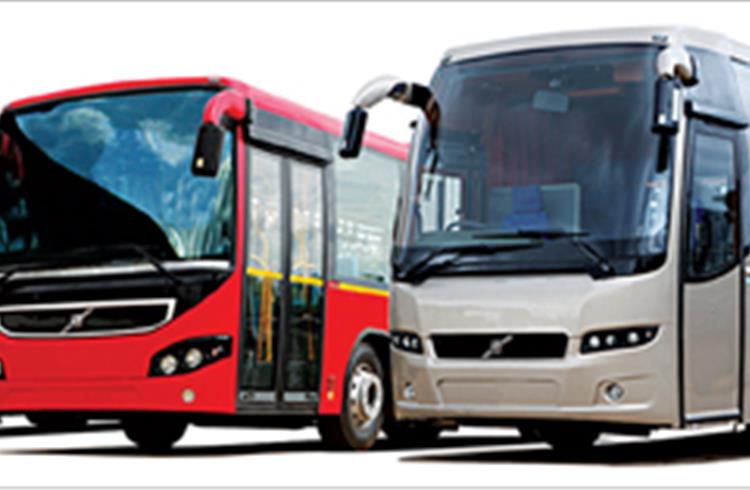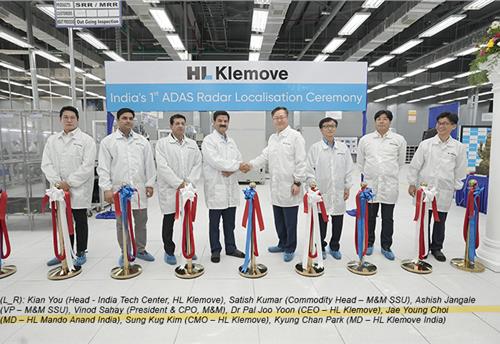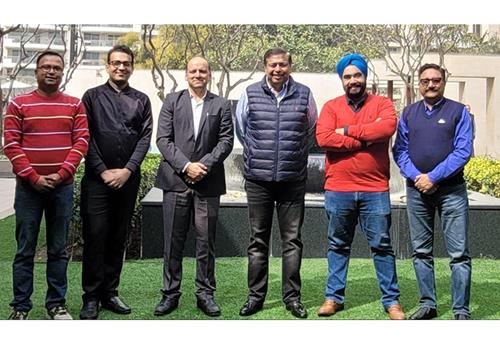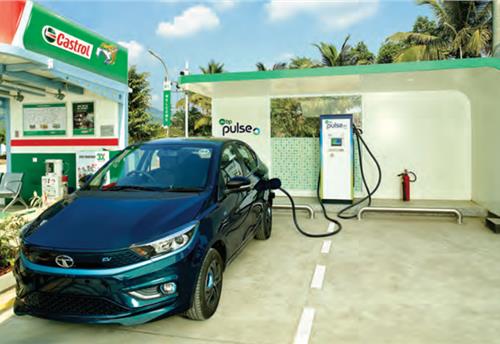2012 Commercial Vehicles Special:Volvo, Scania rev up India market plans
Volvo Buses, which has been in India since 1998, already commands an 80 percent share in the luxury coach market and around 50 percent share in the low-floor diesel city bus market.
Volvo Buses, which has been in India since 1998, already commands an 80 percent share in the luxury coach market and around 50 percent share in the low-floor diesel city bus market. At present, around 4,500 Volvo buses ply on Indian roads while Volvo city buses operate across 13 cities in the country. Now with demand for heavy duty trucks growing on the back of increasing cargo movement and construction activities, both Volvo and Scania are eyeing a major chunk of this market. Both seem willing to wait out the current dip in CV fortunes in India.
In the eight-month April-November 2012 period, cumulative CV sales are 513,802 units, a 2.73 percent increase over the 500,161 units sold in the year-ago period. However, overall M&HCV growth is down in April-November by 16.34 percent to 178,974 units compared to 213,937 units in the year-ago period. In the segment, good carriers have borne the brunt of the downturn (down 19.96 percent) while passenger carriers are up 6.93 percent. But most CV majors are willing to wait out the downturn, instead preferring to use the time to properly study the Indian market and roll out specific products of interest to certain segments.
 |
Volvo Group accelerates India programme
Having been in India for over 11 years, it is only now that the Volvo Group is looking to accelerate its engagement with India, unveiling major investment plans and showing its thirst in fully tapping the Indian market for its products. According to Olof Persson, president and CEO of the Volvo Group, who made his first visit to India last month, the company considers India as one of its major markets. He says the country will play a major role in the Group’s global revenues in the coming years. He claims the company enjoys a market share of around 60 percent in the Indian premium truck segment and aims to increase that share. He adds that around 50 percent of the Group’s global revenue has been recorded from North America and Europe while the remaining 50 percent comes from emerging markets, in which Asia plays a major role. Within Asia, India clearly has the maximum potential what with increased government spend on new road infrastructure across the country. Backed by 4,000 employees, the Group is now lining up a chain of investments in India.
The Rs 2,000 crore investment in India, spread over the next four years, will be injected in the Volvo Group’s various divisions including buses, trucks, construction equipment and IT-backed R&D activities for commercial vehicles. Furthermore, it is making a Rs 1,800 crore investment along with its partner Eicher Motors. VE Commercial Vehicles (VECV), the 50:50 joint venture between the Volvo Group and Eicher Motors, will utilise this investment for many projects including its upcoming engine plant at Pithampur in Madhya Pradesh, product development, a test facility and a state-of-the-art paint shop. In fact the powertrain facility has been set up as part of Volvo’s global first initiative, reflecting the Volvo-Eicher synergy.
The facility will be a global hub for Volvo to meet its medium-duty automotive engine requirements. By 2016, the engine plant, which will have a production capacity of 100,000 units per annum, will be capable of exporting 30 percent of its production to Volvo’s other vehicle assembly units across the world.
Volvo is looking at high localisation levels for its engines and is actively exploring having a good component supplier base in India. Persson, while making an announcement on investments in India in mid-November this year, said: “When we are having major operations in India, localisation is important. We are working and we have been working on this before. Now, together with Eicher, we can accelerate the process of finding a supplier base.” But he declined to provide details over the percentage of localisation in the engines to be manufactured in the country.
According to sources close to the development, VECV has already initiated talks with various automotive component manufacturers in Karnataka and in the northern parts of the country to source components for its engines to be manufactured in the upcoming Pithampur plant.
The powertrain facility will be a global hub for meeting Volvo’s requirements for medium duty (5- and 8-litre) automotive engines. The Euro 6-compliant diesel-powered engines will be supplied to Volvo Europe and the same platform will be adapted to Euro 3 and 4 engine technologies for VECV’s requirements. The engine assembly plant will have 39 percent automation level. Currently, construction work on the facility is underway with installation of complete equipment scheduled to be completed later this month. Production is expected to commence from July 2013.
Scania gears up
Scania too has chalked out major plans for India. The Swedish manufacturer’s Indian innings began in 2007 when it started selling its trucks for the mining and construction industry through Larsen & Toubro.
It is now building a greenfield bus and truck manufacturing plant, at the emerging industrial area of Narasapura in Kolar district, about 8km down Old Madras Road from its Swedish compatriot Volvo’s Indian base near Hoskote, Bangalore, at an estimated investment of Rs 250 crore. While the truck division will start rolling out vehicles from April next year, bus production will commence by the end of 2013.
Interestingly, the company did not want to wait till its truck plant begins operations next year to showcase its products. Last month, it introduced its first set of four on-road trucks in India. These vehicles will be imported as Completely Built Units (CBUs) till it kick-starts production in the Bangalore plant, which will roll out both on-road and off-road vehicles along with buses. In an earlier interview to this magazine, Henrik Fagrenius, managing director of Scania Commercial Vehicles India (SCVI), said the company is weighing options to introduce all its possible products including specialty vehicles in the future. While its tie-up with L&T for the mining segment will remain, he says the on-road trucks will be sold directly by the company through its dealership network. Around 40 percent work in phase 1 of plant construction has been achieved. The bus assembly plant is expected to commence operations from the end of 2013 or early 2014. The earmarked investment of Rs 250 crore will be spent till end-2013.
The upcoming manufacturing plant will be a completely knocked-down (CKD) assembly unit for truck and bus chassis. Body building of city buses and coaches is also planned in the facility, he says. It has been specially designed to be in line with global standards of the Scania Group.
Fagrenius says that the company plans to produce and sell 2,000 heavy trucks and 1,000 intercity buses and coaches per year within the next five years. Scania’s manufacturing facility is aimed at further boosting the company’s sales and service activities in India. This will bring in a greater variety of models and also shorten the delivery time for customers. Scania’s strategies for India are innovative, offering value through lower total cost of ownership for customers, and will bring in the best products and services to the country, he points out.
As part of its expansion in India, SCVI has also opened a full-fledged Central Parts Centre (CPC) in Bangalore. The company is importing parts from its global parts centre in Belgium to stock at the CPC in India to service its vehicles sold through L&T.
Talking to Autocar Professional at the four-truck rollout last month, Suresh Ekambaram, director – aftersales, SCVI, said: “The company’s CPC established near Bangalore is fully operational since October 23 and it will supply parts to L&T in India."
Scania’s central warehouse in Belgium was inaugurated in 1993 and since 2007 has served as the parts distribution hub for the company’s 1,000 or so European dealerships and to the regional warehouses that supply Scania dealerships in the rest of the world.
JAISHANKAR JAYARAMIAH
RELATED ARTICLES
Branded content: HL Klemove inaugurates first Local ADAS Radar Manufacturing Unit in India, marks a significant achievement in “Make in India” initiative
The inauguration ceremony was held in the presence of Vinod Sahay, President and CPO of Mahindra & Mahindra Ltd. and Dr....
BluWheelz to 'Green Up' logistics sector
With their EVs-as-a-service solution, the startup is playing it smart with costs and looking to electrify the entire seg...
BRANDED CONTENT: Spearheading the EV revolution in India
Jio-bp is a joint venture between Reliance Industries and BP PLC where both entities have married international expertis...





 By Autocar Pro News Desk
By Autocar Pro News Desk
 19 Dec 2012
19 Dec 2012
 3796 Views
3796 Views









